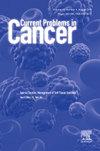利用机器学习技术探索头颈部鳞状细胞癌患者分层:初步结果。
IF 2.3
4区 医学
Q3 ONCOLOGY
引用次数: 0
摘要
背景:头颈部鳞状细胞癌(HNSCC)因其固有的异质性,给肿瘤学带来了巨大挑战。传统的分期系统,如 TNM(肿瘤、结节、转移),只能提供有关患者预后和治疗反应的有限信息。我们需要一个更强大的系统来改善患者分层:在这项研究中,我们利用先进的统计技术来探索超越 TNM 分期局限的患者分层。我们对包括临床、放射学、基因组学和病理学数据在内的综合数据集进行了分析。分析方法包括变量对和变量三的相关性分析,以及聚类技术:结果:分析表明,HNSCC 亚群表现出不同的特征,这对传统的 "一刀切 "方法提出了挑战:结论:这项研究强调了基于患者综合特征分析的个性化治疗策略的潜力,为实现更加个性化的治疗干预提供了途径。本文章由计算机程序翻译,如有差异,请以英文原文为准。
Exploring patient stratification in head and neck squamous cell carcinoma using machine learning techniques: Preliminary results
Background
Head and Neck Squamous Cell Carcinoma (HNSCC) presents a significant challenge in oncology due to its inherent heterogeneity. Traditional staging systems, such as TNM (Tumor, Node, Metastasis), provide limited information regarding patient outcomes and treatment responses. There is a need for a more robust system to improve patient stratification.
Method
In this study, we utilized advanced statistical techniques to explore patient stratification beyond the limitations of TNM staging. A comprehensive dataset, including clinical, radiomic, genomic, and pathological data, was analyzed. The methodology involved correlation analysis of variable pairs and triples, followed by clustering techniques.
Results
The analysis revealed that HNSCC subpopulations exhibit distinct characteristics, which challenge the conventional one-size-fits-all approach.
Conclusion
This study underscores the potential for personalized treatment strategies based on comprehensive patient profiling, offering a pathway towards more individualized therapeutic interventions.
求助全文
通过发布文献求助,成功后即可免费获取论文全文。
去求助
来源期刊

Current Problems in Cancer
医学-肿瘤学
CiteScore
5.10
自引率
0.00%
发文量
71
审稿时长
15 days
期刊介绍:
Current Problems in Cancer seeks to promote and disseminate innovative, transformative, and impactful data on patient-oriented cancer research and clinical care. Specifically, the journal''s scope is focused on reporting the results of well-designed cancer studies that influence/alter practice or identify new directions in clinical cancer research. These studies can include novel therapeutic approaches, new strategies for early diagnosis, cancer clinical trials, and supportive care, among others. Papers that focus solely on laboratory-based or basic science research are discouraged. The journal''s format also allows, on occasion, for a multi-faceted overview of a single topic via a curated selection of review articles, while also offering articles that present dynamic material that influences the oncology field.
 求助内容:
求助内容: 应助结果提醒方式:
应助结果提醒方式:


